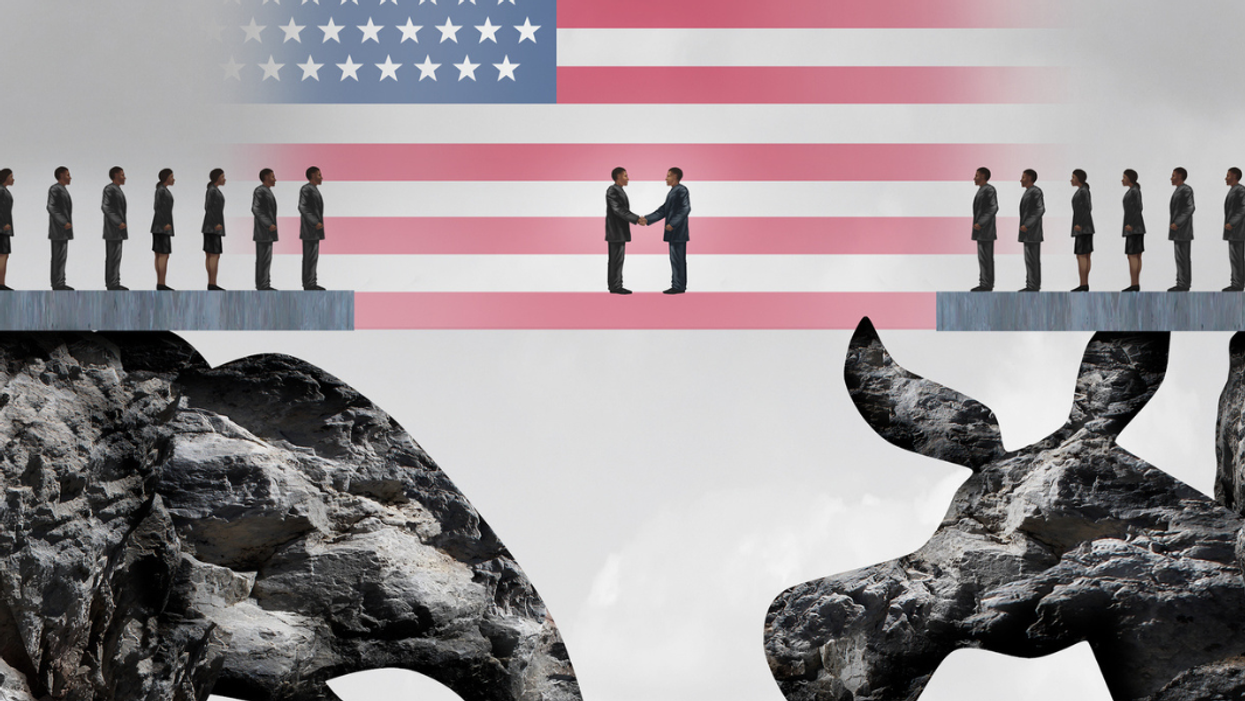Steve Corbin is Professor Emeritus of Marketing at the University of Northern Iowa.
The numbers are in. It’s abundantly clear Americans not only want the divisive Congress to quit playing games and become bipartisan leaders – like the good old days – but in 2024 cast Joe Biden and Donald Trump aside and elect a middle-of-the-road president.
Regarding bipartisanship, the latest PBS NewsHour, NPR and Marist poll reveals 74% of Americans want Congress to work together. Similarly, a Gallup poll reveals only 16% of Americans consider themselves “very conservative” or “very liberal.” In Congress we know these fringe groups are represented by the wacko right-wing Freedom Caucus and the out-of-touch left-wing Progressive Caucus.
Americans are demanding our Congressional delegates start acting like adults, abandon their respective weird partisan affiliation groups, view compromise as healthy and put people-before-politics . . . or . . . we’ll replace them with a bipartisan legislator.
The not-for-profit Bipartisan Policy Center, founded in 2007 by former Senators Howard Baker (Rep.), Tom Daschle (Dem), Bob Dole (Rep.) and George Mitchell (Dem.), along with the non-profit No Labels, founded in 2010 to bring America’s leaders together to solve big problems, identify a host of across-the-aisle endeavors to prove bipartisanship can and has worked.
They include creation of social security (1935), National Interstate and Defense Highways Act (1956), 1964’s Civil Rights Act, Voting Rights Act of 1965, Americans with Disabilities Act (1990), 1997-Children’s Health Insurance Program (CHIP), Balanced Budget Act (1997), and 2015-Every Student Succeeds Act.
Americans who favor bipartisanship ought to pay attention to the Problem Solvers Caucus, which was created in 2017 by No Labels. The caucus is now an independent US House of Representatives’ assembly that is driven by over 60 members -- equally divided between Democrats and Republicans -- who foster impartial, unprejudiced and non-partisan cooperation on key policy issues. The Senate does not have a caucus format, but many senators are allies to the Problem Solvers Caucus.
The Problem Solvers Caucus has played a significant role in making bipartisan deals such as the COVID-19 relief bill, ongoing health coverage for veterans exposed to military burn pits, $973 billion Infrastructure Investment and Jobs Act (2021), gun safety bill (2022), CHIPS and Science Act of 2022 and the Election Count Reform Act (2022).
On April 19, the Problem Solvers Caucus announced “its endorsement of a bipartisan debt ceiling framework comprised of steps to avoid defaulting on the national debt and advancing a sustainable budget.” The members are also addressing the immigration and border security issue, which has plagued Americans since 2014. With a divided Senate and House of Representatives, we know bipartisanship is required for these two important issues to be resolved. The Problem Solvers Caucus is coming to Americans’ rescue.
On Nov. 5, 2024, we will elect the next president and early polling speaks volumes. First, 65% of Americans don’t want Biden OR Trump to run again (Morning Consult). Secondly, a Harvard CAPS/Harris poll revealed nearly 60% of Americans would consider voting for a moderate independent if Biden and Trump seek office.
Who understands this data? No Labels, America’s centrist organization. They recently announced plans to lay the groundwork for an independent Unity ticket in 2024. This option is billed as an `insurance policy’ that will only be used if the Democratic and Republican presidential nominees are not acceptable. Logically, this announcement has greatly disturbed GOP and Democrat partisans.
If you want Congress to become more bipartisan and/or believe we need a centrist president in 2024, follow the Bipartisan Policy Center, No Labels and Problem Solvers Caucus as they are onto something that’s long overdue. Also, go to https://problemsolverscaucus.house.gov to see if your legislator is listed as a bipartisan Congressional delegate.



















Trump & Hegseth gave Mark Kelly a huge 2028 gift